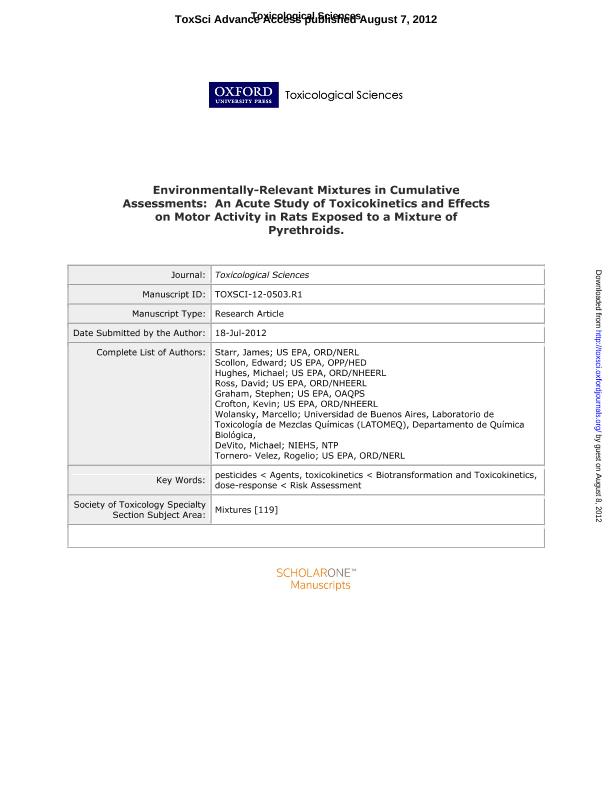Mostrar el registro sencillo del ítem
dc.contributor.author
Starr, James M.
dc.contributor.author
Scollon, Edward J.
dc.contributor.author
Hughes, Michael F.
dc.contributor.author
Ross, David G.
dc.contributor.author
Graham, Stephen E.
dc.contributor.author
Crofton, Kevin M.
dc.contributor.author
Wolansky, Marcelo Javier

dc.contributor.author
DeVito, Michael J.
dc.contributor.author
Tornero-Velez, Rogelio
dc.date.available
2018-12-26T19:13:21Z
dc.date.issued
2012-12
dc.identifier.citation
Starr, James M.; Scollon, Edward J.; Hughes, Michael F.; Ross, David G.; Graham, Stephen E.; et al.; Environmentally relevant mixtures in cumulative assessments: An acute study of toxicokinetics and effects on motor activity in rats exposed to a mixture of pyrethroids; Oxford University Press; Toxicological Sciences; 130; 2; 12-2012; 309-318
dc.identifier.issn
1096-6080
dc.identifier.uri
http://hdl.handle.net/11336/66988
dc.description.abstract
Due to extensive use, human exposure to multiple pyrethroid insecticides occurs frequently. Studies of pyrethroid neurotoxicity suggest a common mode of toxicity and that pyrethroids should be considered cumulatively to model risk. The objective of this work was to use a pyrethroid mixture that reflects human exposure to common pyrethroids to develop comparative toxicokinetic profiles in rats, and then model the relationship between brain concentration and motor activity. Data from a national survey of child care centers were used to make a mixture reflecting proportions of the most prevalent pyrethroids: permethrin, cypermethrin, β-cyfluthrin, deltamethrin, and esfenvalerate. The mixture was administered orally at one of two concentrations (11.2 and 27.4 mg/kg) to adult male rats. At intervals from 1 to 24h, motor activity was assessed and the animals were sacrificed. Pyrethroid concentrations were measured in the blood, liver, fat, and brain. After controlling for dose, there were no differences in any tissue concentrations, except blood at the initial time point. Elimination half-lives for all pyrethroids in all tissues were < 7h. Brain concentrations of all pyrethroids (when cis- and trans-permethrin were pooled) at the initial time point were proportional to their relative doses. Decreases in motor activity indicated dose additivity, and the relationship between pyrethroid brain concentration and motor activity was described by a four-parameter sigmoidal Emax model. This study links environmental data with toxicokinetic and neurobehavioral assays to support cumulative risk assessments of pyrethroid pesticides. The results support the additive model of pyrethroid effect on motor activity and suggest that variation in the neurotoxicity of individual pyrethroids is related to toxicodynamic rather than toxicokinetic differences.
dc.format
application/pdf
dc.language.iso
eng
dc.publisher
Oxford University Press

dc.rights
info:eu-repo/semantics/openAccess
dc.rights.uri
https://creativecommons.org/licenses/by-nc-sa/2.5/ar/
dc.subject
Cumulative Risk
dc.subject
Motor Activity
dc.subject
Pyrethroids
dc.subject
Toxicokinetics
dc.subject.classification
Otras Ciencias Químicas

dc.subject.classification
Ciencias Químicas

dc.subject.classification
CIENCIAS NATURALES Y EXACTAS

dc.subject.classification
Salud Ocupacional

dc.subject.classification
Ciencias de la Salud

dc.subject.classification
CIENCIAS MÉDICAS Y DE LA SALUD

dc.title
Environmentally relevant mixtures in cumulative assessments: An acute study of toxicokinetics and effects on motor activity in rats exposed to a mixture of pyrethroids
dc.type
info:eu-repo/semantics/article
dc.type
info:ar-repo/semantics/artículo
dc.type
info:eu-repo/semantics/publishedVersion
dc.date.updated
2018-11-05T18:58:35Z
dc.journal.volume
130
dc.journal.number
2
dc.journal.pagination
309-318
dc.journal.pais
Reino Unido

dc.journal.ciudad
Oxford
dc.description.fil
Fil: Starr, James M.. United States Environmental Protection Agency; Estados Unidos
dc.description.fil
Fil: Scollon, Edward J.. United States Environmental Protection Agency; Estados Unidos
dc.description.fil
Fil: Hughes, Michael F.. United States Environmental Protection Agency; Estados Unidos
dc.description.fil
Fil: Ross, David G.. United States Environmental Protection Agency; Estados Unidos
dc.description.fil
Fil: Graham, Stephen E.. United States Environmental Protection Agency; Estados Unidos
dc.description.fil
Fil: Crofton, Kevin M.. United States Environmental Protection Agency; Estados Unidos
dc.description.fil
Fil: Wolansky, Marcelo Javier. United States Environmental Protection Agency; Estados Unidos. Consejo Nacional de Investigaciones Científicas y Técnicas. Oficina de Coordinación Administrativa Ciudad Universitaria. Instituto de Química Biológica de la Facultad de Ciencias Exactas y Naturales. Universidad de Buenos Aires. Facultad de Ciencias Exactas y Naturales. Instituto de Química Biológica de la Facultad de Ciencias Exactas y Naturales; Argentina
dc.description.fil
Fil: DeVito, Michael J.. United States Environmental Protection Agency; Estados Unidos
dc.description.fil
Fil: Tornero-Velez, Rogelio. United States Environmental Protection Agency; Estados Unidos
dc.journal.title
Toxicological Sciences

dc.relation.alternativeid
info:eu-repo/semantics/altIdentifier/doi/https://dx.doi.org/10.1093/toxsci/kfs245
dc.relation.alternativeid
info:eu-repo/semantics/altIdentifier/url/https://academic.oup.com/toxsci/article/130/2/309/1724700
Archivos asociados
